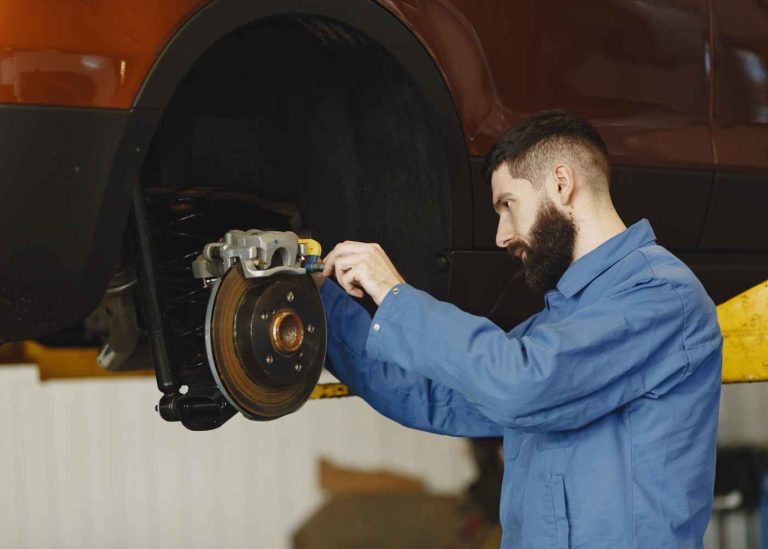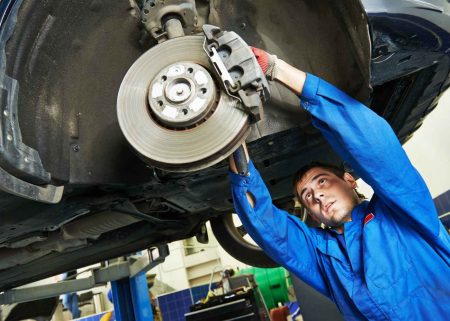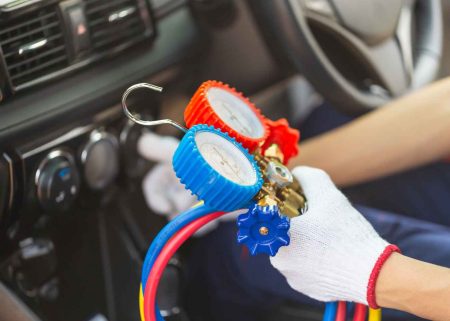Your car’s braking system is arguably the most important safety feature of your vehicle, responsible for bringing you to a safe stop in all driving conditions. Maintaining optimal brake performance isn’t just about avoiding expensive repairs—it’s about protecting yourself, your passengers, and other drivers on the road from potentially dangerous situations.
Many drivers take their brakes for granted until problems develop, but proactive maintenance keeps your braking system functioning reliably while preventing costly emergency repairs. Understanding how to maintain your brakes properly helps ensure they’re always ready to perform when you need them most.
The key to excellent brake performance lies in regular maintenance, prompt attention to warning signs, and working with qualified professionals who understand the complexities of modern braking systems.
Monitoring Brake Fluid Levels and Quality
Brake fluid serves as the critical link between your brake pedal and the components that actually stop your vehicle. This hydraulic fluid transfers the force from your foot to the brake pads and rotors, making proper fluid levels and quality essential for reliable braking performance.
Check your brake fluid regularly by locating the brake fluid reservoir under your hood and ensuring the fluid level stays between the minimum and maximum marks. Low brake fluid often indicates worn brake pads or potential leaks in the system that require immediate professional attention.
Brake fluid quality deteriorates over time as it absorbs moisture from the air, which can lead to reduced braking effectiveness and internal corrosion of brake system components. Fresh brake fluid appears clear or slightly amber, while old fluid becomes dark and cloudy, indicating the need for replacement.
Professional brake fluid changes at recommended intervals help maintain optimal braking performance while preventing moisture-related damage to expensive brake system components like calipers and brake lines.
Replacing Brake Pads When Needed
Brake pads create the friction necessary to stop your vehicle by pressing against the brake rotors when you apply the brakes. These pads gradually wear down through normal use and must be replaced before they become too thin to provide effective stopping power.
Listen for squealing or grinding noises when braking, as these sounds often indicate worn brake pads that need immediate replacement. Grinding noises suggest the pads have worn completely through, potentially damaging rotors and creating expensive repair situations.
Visual inspection of brake pads through your wheel spokes can reveal their condition, though professional evaluation provides more accurate assessment of remaining pad life and overall brake system health.
Replacing brake pads promptly when they show wear prevents damage to rotors and other brake components while maintaining optimal stopping performance. Delaying pad replacement often leads to more expensive repairs and compromised safety.
Maintaining Brake Rotors and Drums
Brake rotors and drums provide the surfaces against which brake pads and shoes create friction to stop your vehicle. These components require proper maintenance to ensure smooth, effective braking without vibration, noise, or reduced stopping power.
Rotor resurfacing removes minor imperfections and restores smooth surfaces for optimal brake pad contact. The importance of replacing the brake lathe equipment used for this process cannot be overstated, as worn or improperly calibrated lathes can create uneven surfaces that cause vibration and reduced braking effectiveness.
Professional shops with modern, well-maintained brake lathes can restore rotors to specifications that provide smooth braking and extended component life. Quality rotor resurfacing often costs much less than rotor replacement while delivering excellent performance.
Severe rotor damage like deep grooves, cracks, or excessive thickness variation requires rotor replacement rather than resurfacing. Professional evaluation determines whether rotors can be safely resurfaced or need complete replacement.
Checking Brake System Components
Your brake system includes numerous components beyond pads and rotors that require regular inspection to ensure optimal performance. Brake lines, calipers, master cylinders, and hardware all play crucial roles in safe, effective braking.
Brake lines and hoses can develop leaks, cracks, or corrosion that compromise brake performance and create dangerous situations. Regular inspection identifies these problems before they result in brake failure or reduced stopping ability.
Brake calipers must move freely and apply even pressure to brake pads for optimal performance. Sticking or seized calipers cause uneven pad wear and reduced braking effectiveness that requires professional attention.
Hardware components like springs, clips, and pins ensure proper brake pad alignment and movement. Corroded or damaged hardware can cause noise, uneven wear, and reduced performance that affects overall braking effectiveness.
Practicing Good Driving Habits
Your driving style significantly affects brake system longevity and performance. Aggressive braking, riding the brakes, and other poor habits accelerate wear while reducing braking effectiveness when you need it most.
Anticipate stops by beginning to slow down gradually rather than waiting until the last moment to brake hard. This technique reduces brake wear while providing better control and stopping performance in emergency situations.
Avoid riding the brakes during downhill driving or in stop-and-go traffic, as constant brake application creates excessive heat that can fade braking performance and accelerate component wear.
Engine braking through downshifting or using lower gears helps reduce brake system workload during long downhill stretches, preserving brake performance for when you need maximum stopping power.
Scheduling Professional Inspections
Regular professional brake inspections identify potential problems before they become safety hazards or expensive repairs. Qualified technicians can evaluate your entire brake system and recommend appropriate maintenance or repairs.
Professional brake service includes comprehensive inspection of all system components, proper brake fluid bleeding, and verification that your brakes meet safety standards for reliable performance.
Annual brake inspections or inspections based on mileage recommendations help ensure your braking system remains in optimal condition while preventing unexpected failures that could compromise safety.
Prioritizing Brake Safety
Never compromise on brake system maintenance or repairs, as effective braking is essential for safe driving in all conditions. Address brake problems immediately and work with qualified professionals who understand the importance of proper brake system service.
Invest in quality brake components and professional service that ensures your braking system performs reliably when you need it most, protecting yourself and others on the road.



